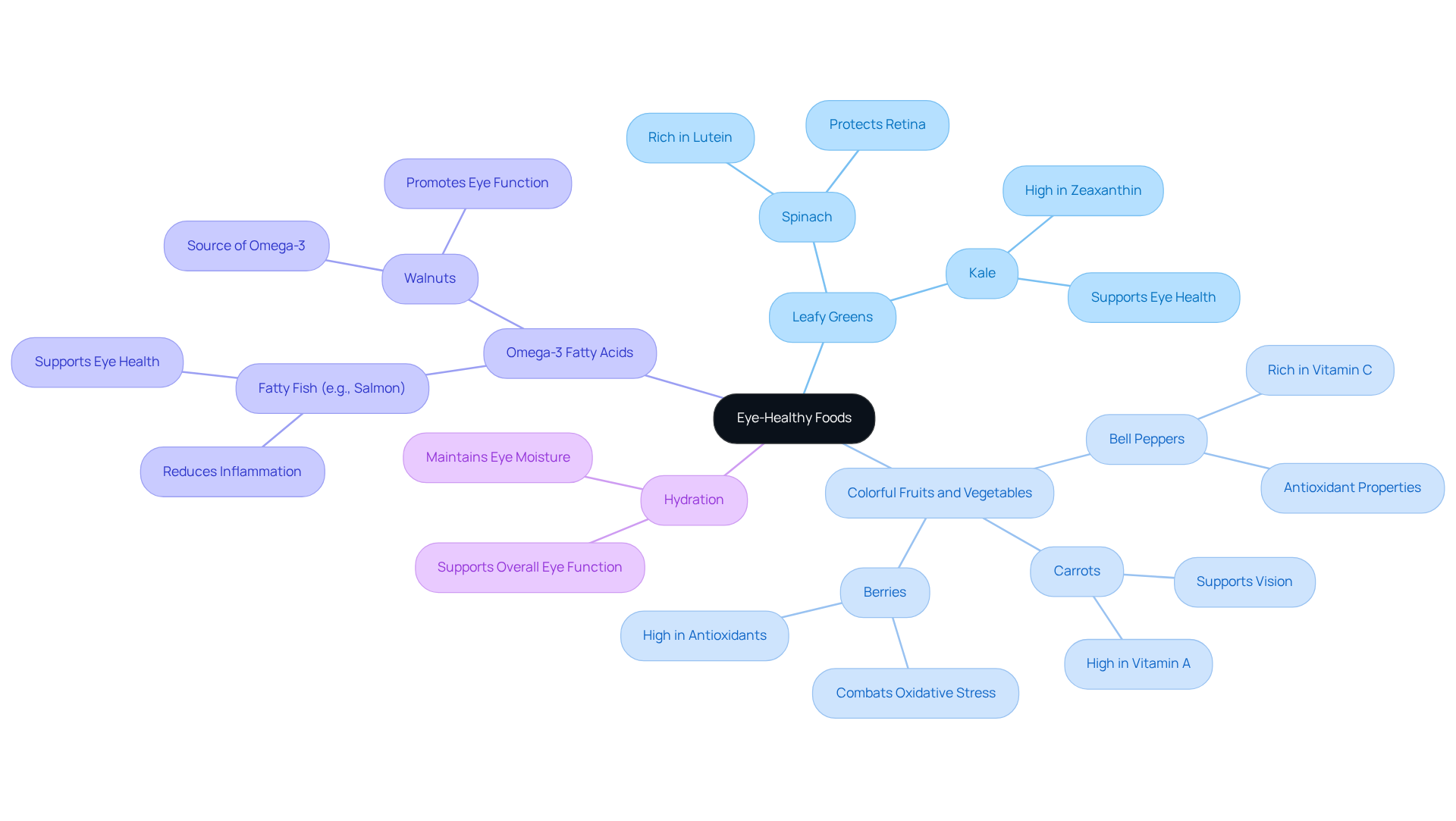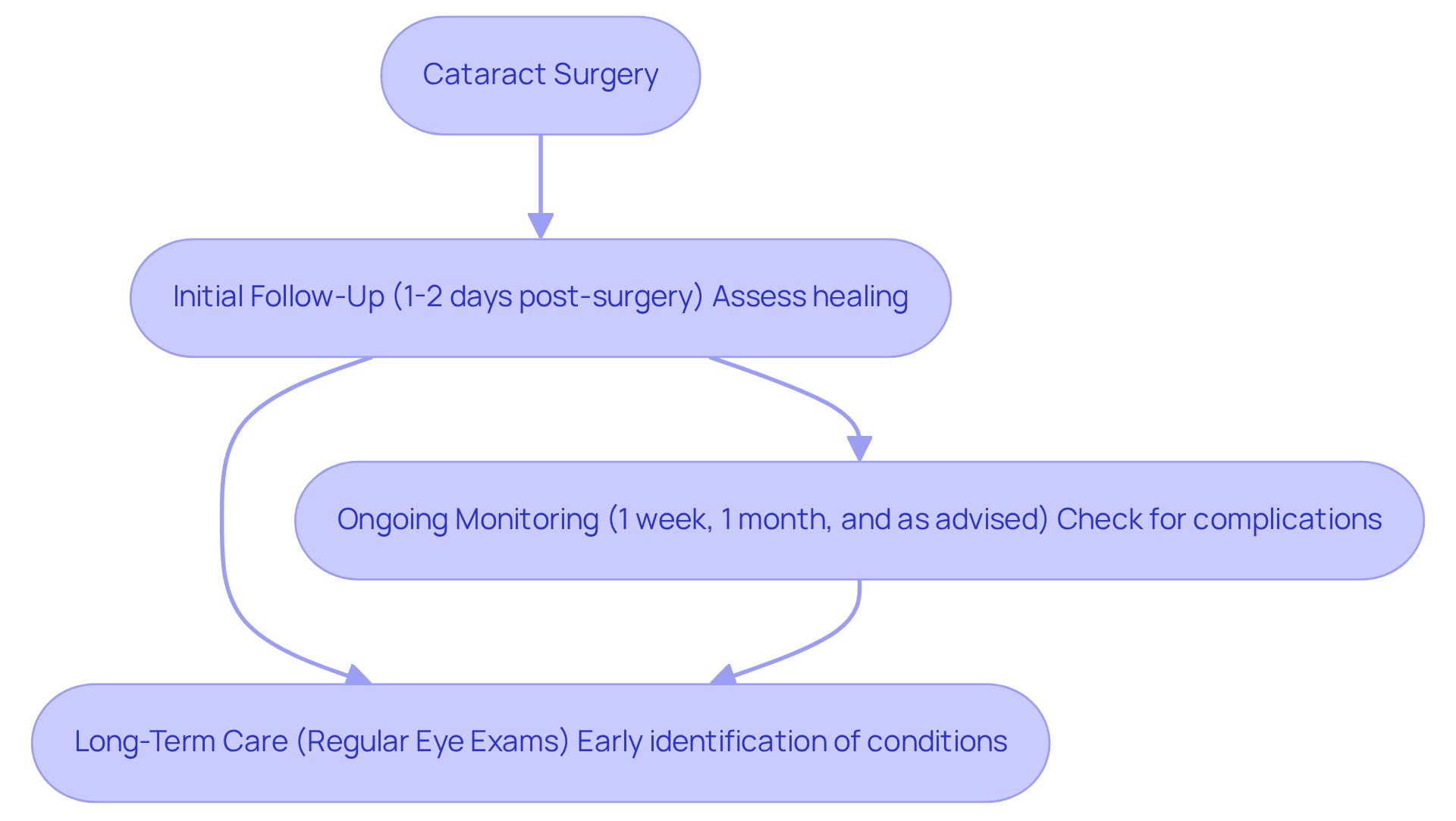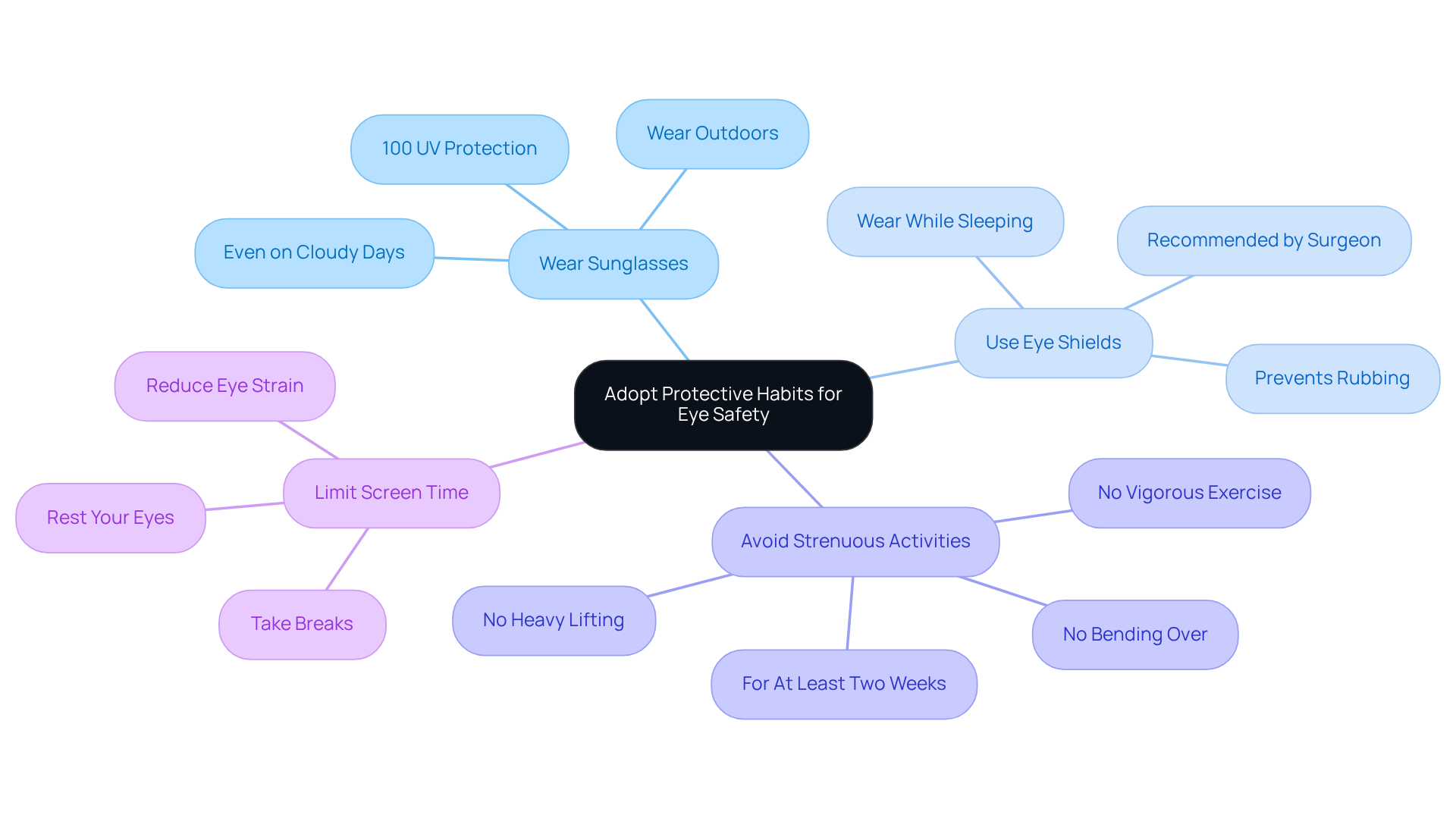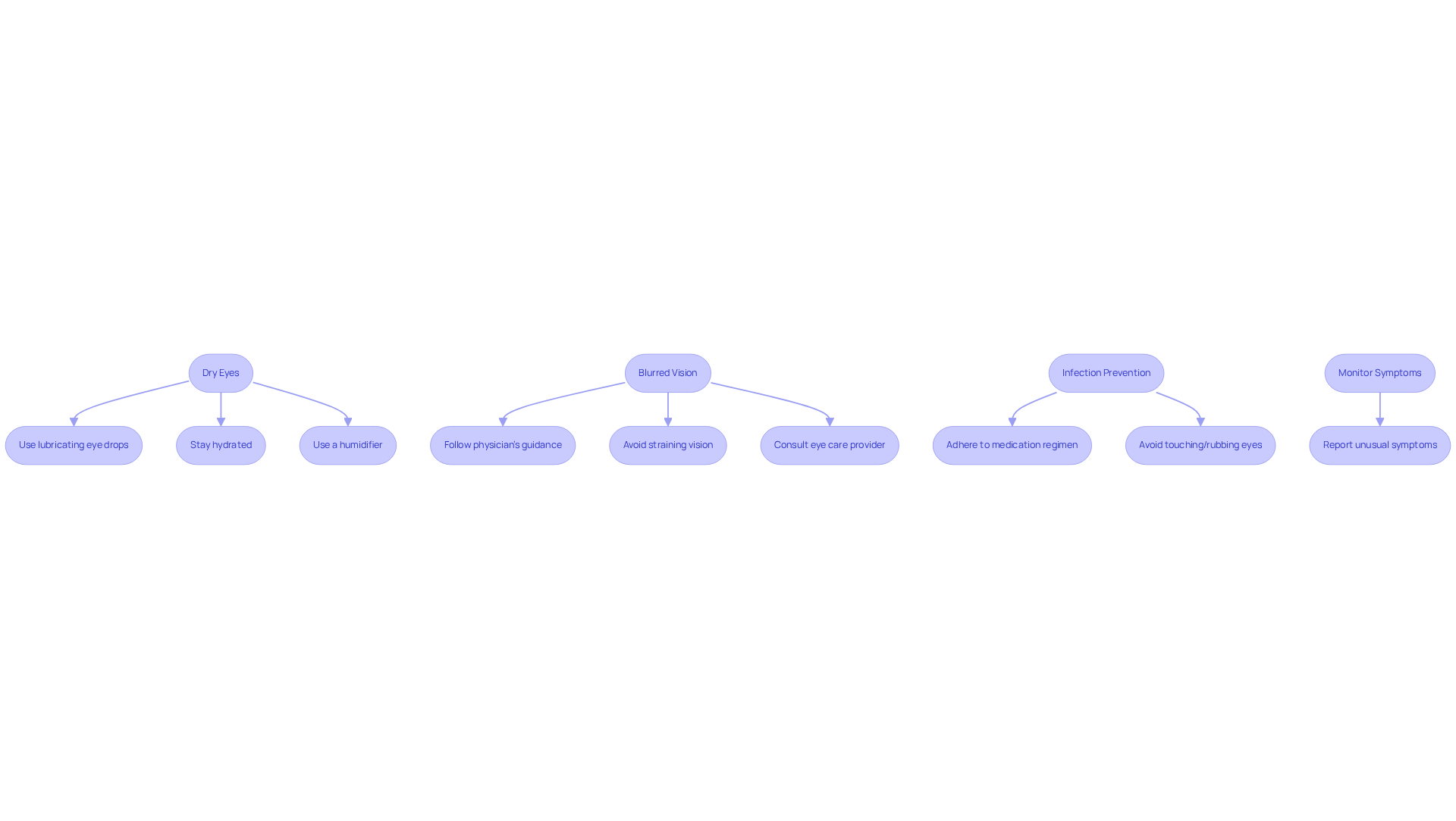Posted by: Northwest Eye in General on September 19, 2025
Overview
We understand that after cataract surgery, maintaining healthy eyes is a top priority for you. Incorporating eye-healthy foods into your diet, scheduling regular comprehensive eye exams, adopting protective habits, and effectively managing common eye conditions are all essential steps in your recovery.
It’s important to focus on consuming nutrient-rich foods that support healing. Attending follow-up appointments ensures that your progress is monitored closely, giving you peace of mind. Remember to protect your eyes from harmful UV rays, as this is crucial for your long-term eye health. Additionally, using prescribed treatments for symptoms like dry eyes can significantly enhance your comfort during this time.
These practices are not just recommendations; they are vital for promoting healing and preventing complications during your recovery journey. We are here to help you through this process, ensuring you feel supported every step of the way.
Introduction
Recovering from cataract surgery is a critical period that can significantly influence your long-term eye health. We understand that this time can feel overwhelming, and embracing best practices during recovery not only aids in healing but also enhances your overall vision quality. It’s common to feel uncertain about the most effective steps to take. What essential strategies should you prioritize to ensure healthy eyes and a smooth recovery post-surgery?
We are here to help you through this process, providing guidance and support as you navigate your recovery journey.
Incorporate Eye-Healthy Foods into Your Diet
After cataract surgery, we understand that focusing on your recovery is important. Incorporating foods that promote healthy eyes into your diet can significantly enhance this process. Here are some nourishing options to consider:
- Leafy Greens: Foods like spinach and kale are rich in lutein and zeaxanthin, which help protect your retina.
- Colorful Fruits and Vegetables: Carrots, bell peppers, and berries are high in antioxidants, particularly vitamins A, C, and E, which combat oxidative stress.
- Omega-3 Fatty Acids: Fatty fish such as salmon and walnuts can help reduce inflammation and support healthy eyes.
- Hydration: Staying well-hydrated is essential for maintaining optimal eye moisture and function.
We encourage you to create a that includes these foods to support your healing process effectively. For instance, a salad with spinach, carrots, and a handful of walnuts can be a delicious and nutritious option. Remember, we are here to help you through this process, and taking these steps can make a positive difference in your recovery.

Schedule Regular Comprehensive Eye Exams
After your cataract operation, we understand how important it is for you to have regular, thorough eye examinations at Northwest Eye. These appointments are vital for tracking your progress and ensuring your eyes are healing correctly. Here’s what to keep in mind:
- Initial Follow-Up: It’s common to feel anxious after surgery, so typically, you should have a follow-up appointment within a day or two. This visit allows us to assess your healing and check for any symptoms, such as , which can indicate complications.
- Ongoing Monitoring: We recommend scheduling subsequent exams at one week, one month, and then as advised by your ophthalmologist. These visits are essential for checking for any complications, such as infection or increased eye pressure. They also provide an opportunity to address any concerns like halos or glare that may arise during your recovery.
- Long-Term Care: Regular eye exams at Northwest Eye are crucial for ensuring healthy eyes, especially as you age. These visits help in the early identification of other possible eye conditions, ensuring timely intervention and preserving your vision. Additionally, we offer financial assistance and insurance verification to help you navigate your options post-surgery.
Establishing a routine of attending these appointments is important, as they are crucial for your overall health and for maintaining healthy eyes. Remember, we are here to help you through this process.

Adopt Protective Habits for Eye Safety
Adopting protective habits is essential for ensuring a safe healing process after cataract surgery, especially if you have received the innovative Light Adjustable Lens (LAL). We understand that this recovery period can feel overwhelming, but implementing a few key practices can significantly enhance your experience.
- Wear Sunglasses: Protect your eyes from by wearing sunglasses with 100% UV protection whenever you are outdoors, even on cloudy days. It’s common to overlook this, but your eyes deserve this extra care.
- Use Eye Shields: Your surgeon may recommend wearing an eye shield while sleeping for at least the first week. This simple step can prevent accidental rubbing or pressure on your eye, ensuring a smoother recovery.
- Avoid Strenuous Activities: We know it can be tempting to return to your routine, but please refrain from heavy lifting, bending over, or engaging in vigorous exercise for at least a couple of weeks post-surgery. This helps to avoid increasing eye pressure, which is crucial for your healing.
- Limit Screen Time: Reducing exposure to screens is important to prevent eye strain, especially in the early days after the procedure. We encourage you to take breaks and give your eyes the rest they need.
Implementing these protective measures will assist in ensuring your vision heals properly and minimizes the risk of complications. Remember, we are here to help you through this process, allowing you to fully benefit from the personalized vision correction provided by the LAL.

Manage Common Eye Conditions Effectively
After your cataract operation, it’s common to experience some eye conditions, such as dry eyes or blurred vision. We understand that this can be concerning, but here’s how you can manage these issues effectively:
- Dry Eyes: To help alleviate dryness and discomfort, use the lubricating eye drops prescribed by your ophthalmologist. Staying hydrated and using a humidifier can also make a significant difference.
- Blurred Vision: It’s normal to notice some blurriness after surgery. We encourage you to follow your physician’s guidance regarding and to avoid straining your vision. If the blurriness persists, please consult your eye care provider.
- Infection Prevention: Adhering strictly to your prescribed medication regimen, including antibiotic eye drops, is crucial to prevent infection. Remember to avoid touching or rubbing your eyes.
- Monitor Symptoms: Keep an eye out for any unusual symptoms, such as increased redness, pain, or discharge. If you notice any of these, please report them to your doctor immediately.
By actively managing these conditions, you can enhance your recovery and maintain healthy eyes. We are here to help you through this process, ensuring you feel supported every step of the way.

Conclusion
In the journey of recovery following cataract surgery, prioritizing eye health is essential for achieving the best possible outcomes. We understand that this can be a challenging time, and emphasizing a balanced diet rich in eye-healthy foods, scheduling regular comprehensive eye exams, adopting protective habits, and effectively managing common eye conditions are pivotal practices that can significantly enhance recovery and long-term vision health.
Incorporating nutrient-dense foods such as leafy greens and omega-3 fatty acids into your diet can support eye healing. It’s common to feel overwhelmed, but maintaining a routine of follow-up eye exams allows for monitoring progress and addressing any potential complications early. Protective measures, like wearing sunglasses and minimizing screen time, further contribute to a safer recovery environment. Lastly, managing common post-surgery eye conditions with prescribed treatments ensures that any discomfort is alleviated promptly.
Ultimately, these best practices serve as a roadmap for anyone looking to maintain healthy eyes after cataract surgery. By taking proactive steps, you can not only enhance your recovery experience but also safeguard your vision for years to come. Embracing these recommendations fosters a deeper understanding of the significance of post-operative care, empowering you to prioritize your eye health and enjoy a clearer, brighter future. Remember, we are here to help you through this process.
Frequently Asked Questions
Why is it important to incorporate eye-healthy foods into your diet after cataract surgery?
Incorporating eye-healthy foods can significantly enhance your recovery process by promoting healthy eyes and supporting overall healing.
What types of leafy greens are beneficial for eye health?
Leafy greens like spinach and kale are rich in lutein and zeaxanthin, which help protect the retina.
Which colorful fruits and vegetables should I include in my diet for eye health?
Carrots, bell peppers, and berries are high in antioxidants, particularly vitamins A, C, and E, which combat oxidative stress.
How do omega-3 fatty acids contribute to eye health?
Omega-3 fatty acids, found in fatty fish such as salmon and walnuts, can help reduce inflammation and support healthy eyes.
Why is hydration important for eye health?
Staying well-hydrated is essential for maintaining optimal eye moisture and function.
Can you suggest a meal plan that includes eye-healthy foods?
A nutritious option could be a salad with spinach, carrots, and a handful of walnuts, which combines several eye-healthy ingredients.






